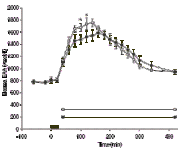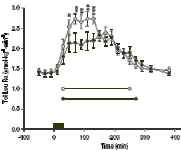Chewing better increases amino acid uptake from meat
The amount of protein you get out of the meat you eat depends on your chewing behaviour, write researchers from the French ministry of agriculture in the American Journal of Clinical Nutrition.
Researchers divide proteins into two groups: fast and slow. Fast proteins, once they have been digested, result in an increase in the number of amino acids in the blood. Slow proteins result in a gradual increase, but one that lasts longer. Fast proteins are best eaten one hour before doing training so that your muscles are better protected against muscle breakdown during the training and so that they can absorb amino acids to grow.
Slow proteins are more suited to bridging the long gaps between meals. Slow proteins are also more efficient than fast ones.
*
Elderly people do not deal as efficiently with protein as young people do. It's as though their protein metabolism is getting rusty. But their protein metabolism does get going again if they take in a large amount of proteins in a short time. This is called protein pulse feeding. Fast proteins are better suited to this than slow ones.
Fast proteins are whey and soya protein. Slow proteins are casein and boiled egg white. But what about protein in meat? This is what the researchers wanted to know as well, so they gave twenty people in their sixties 120 g of meat and measured the amount of amino acids in the subjects' blood.
The graph above shows the amount of essential amino acids in the subjects' blood. The curve with the transparent circles represents the old people who still had their own teeth and could chew ok. The curve with the black circles represents the old people who had dentures.
Meat, the researchers conclude, is a relatively fast protein if you chew it well. And if you can no longer do so, meat is a slow protein.
When the researchers measured the amount of amino acids that the old people absorbed from the meat they discovered something else. The people with dentures absorbed less amino acids from the meat. As a result, the concentration of urea [that's the proteins that the body has processed and no longer has a use for – Ed.] in the blood of the old people with their own teeth rose more than that of the people with dentures. That is why the elderly with their own teeth produced more CO2 after eating.
The graph below shows the results that the researchers obtained when they looked at how much leucine the test subjects absorbed after consuming meat. Leucine is an anabolic signal for muscles, the researchers think.
"The amount of leucine appearing in peripheral blood during the whole postprandial period was lower in denture wearers than in dentate subjects (63% compared with 82% of leucine intake)", the researchers write.
The French also believe that the chewing ability is one of the factors determining how the muscles profit from the proteins in meat. Muscle weakness in the elderly – sarcopenia – is perhaps also partly the result of the deterioration of the teeth.
Sources:*
Am J Clin Nutr. 2007 May;85(5):1286-92.


The amount of protein you get out of the meat you eat depends on your chewing behaviour, write researchers from the French ministry of agriculture in the American Journal of Clinical Nutrition.
Researchers divide proteins into two groups: fast and slow. Fast proteins, once they have been digested, result in an increase in the number of amino acids in the blood. Slow proteins result in a gradual increase, but one that lasts longer. Fast proteins are best eaten one hour before doing training so that your muscles are better protected against muscle breakdown during the training and so that they can absorb amino acids to grow.
Slow proteins are more suited to bridging the long gaps between meals. Slow proteins are also more efficient than fast ones.
*
Elderly people do not deal as efficiently with protein as young people do. It's as though their protein metabolism is getting rusty. But their protein metabolism does get going again if they take in a large amount of proteins in a short time. This is called protein pulse feeding. Fast proteins are better suited to this than slow ones.
Fast proteins are whey and soya protein. Slow proteins are casein and boiled egg white. But what about protein in meat? This is what the researchers wanted to know as well, so they gave twenty people in their sixties 120 g of meat and measured the amount of amino acids in the subjects' blood.
The graph above shows the amount of essential amino acids in the subjects' blood. The curve with the transparent circles represents the old people who still had their own teeth and could chew ok. The curve with the black circles represents the old people who had dentures.
Meat, the researchers conclude, is a relatively fast protein if you chew it well. And if you can no longer do so, meat is a slow protein.
When the researchers measured the amount of amino acids that the old people absorbed from the meat they discovered something else. The people with dentures absorbed less amino acids from the meat. As a result, the concentration of urea [that's the proteins that the body has processed and no longer has a use for – Ed.] in the blood of the old people with their own teeth rose more than that of the people with dentures. That is why the elderly with their own teeth produced more CO2 after eating.
The graph below shows the results that the researchers obtained when they looked at how much leucine the test subjects absorbed after consuming meat. Leucine is an anabolic signal for muscles, the researchers think.
"The amount of leucine appearing in peripheral blood during the whole postprandial period was lower in denture wearers than in dentate subjects (63% compared with 82% of leucine intake)", the researchers write.
The French also believe that the chewing ability is one of the factors determining how the muscles profit from the proteins in meat. Muscle weakness in the elderly – sarcopenia – is perhaps also partly the result of the deterioration of the teeth.
Sources:*
Am J Clin Nutr. 2007 May;85(5):1286-92.



